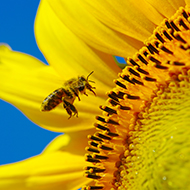'Scent-training' honeybees could boost sunflower production

The scent training drove the bees to visit sunflowers more often and return more pollen to the hive.
A new study has revealed that 'scent-training' honeybees could make them more efficient pollinators.
The research, published in the journal Current Biology, found that honeybees given food that smelt like sunflowers led to a significant boost in the production of sunflower crops.
Walter Farina of Universidad de Buenos Aires, Argentina, said: "We show that it's possible to condition honeybees to a rewarded odour inside the colony, and this experience modifies the bees' odour-guided behaviours later.
"The most surprising and relevant result is that the foraging preferences for the target crop are so prolonged and intensive that it promoted significant increases in the crop yields."
The study built on previous research that found that honeybees could establish stable, long-term memory related to food scents inside the nest. The scientists were also aware that in-hive memories could influence the bees' decisions about which plants to visit later.
To raise bees with a memory to support later sunflower foraging, the team first developed a synthetic odour that the bees associated with the natural floral scent of sunflowers. They then applied this odour to food and gave it to the hives.
Researchers found that early experiences and memories of the scent of sunflower influenced the bees' later foraging preferences, as indicated by their waggle dances.
The scent training drove the bees to visit sunflowers more often and return more pollen to the hive. They add that this boost in sunflower visits also increased the sunflowers' seed production from 29 to 57 per cent.
Farina continued: "Through this procedure, it is possible to bias honeybee foraging activity and increase yields significantly. In other words, pollination services might be improved in pollinator-dependent crops by using simple mimic odours as part of a precision pollination strategy."



 RCVS Knowledge has welcomed Professor Peter Cockcroft as editor-in-chief for Veterinary Evidence.
RCVS Knowledge has welcomed Professor Peter Cockcroft as editor-in-chief for Veterinary Evidence.